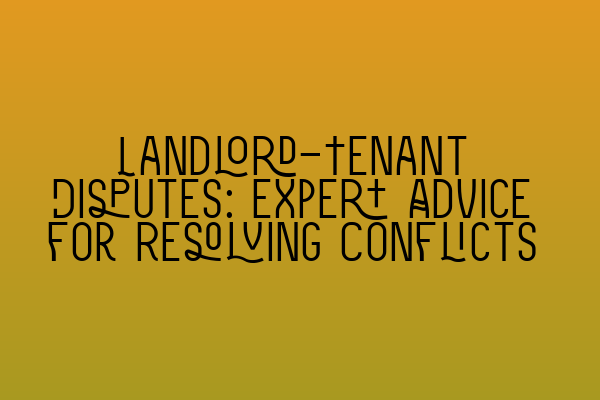Landlord-Tenant Disputes: Expert Advice for Resolving Conflicts
As a solicitor specializing in property and land law, I often come across various disputes between landlords and tenants. These conflicts can arise due to a range of issues such as rent payment disputes, property damage, eviction notices, lease agreements, and more.
Resolving landlord-tenant disputes can be challenging, but with the right advice and guidance, both parties can reach an amicable solution. In this blog post, I will provide expert advice on how to effectively resolve conflicts between landlords and tenants.
1. Open Communication
Clear and open communication is the key to resolving any dispute. Landlords and tenants should establish a line of communication from the beginning of their relationship and encourage ongoing dialogue. This helps in identifying and addressing any issues as they arise.
For example, if a tenant is struggling with the rent payment, they should communicate their financial difficulties to the landlord as soon as possible. Similarly, if a landlord notices property damage, they should immediately notify the tenant and discuss potential solutions.
By fostering open communication, both landlords and tenants can work together to find mutually beneficial solutions.
2. Understand Legal Rights and Obligations
Both landlords and tenants should have a clear understanding of their legal rights and obligations. This knowledge can prevent disputes from escalating and provide a basis for resolving conflicts.
If you are a landlord or tenant facing a dispute, it’s crucial to consult an experienced solicitor who specializes in property and land law. They can guide you through the legal complexities and ensure your rights are protected.
3. Mediation and Arbitration
Mediation and arbitration are alternative dispute resolution methods that can help landlords and tenants reach a resolution without going to court.
Mediation involves a neutral third party who facilitates communication between the parties and assists them in finding a mutually acceptable solution. Arbitration, on the other hand, is a more formal process where an arbitrator makes a binding decision after hearing both sides.
Consider exploring these options to avoid lengthy and costly court battles. An experienced solicitor can advise you on the most appropriate method for your specific dispute.
4. Review Lease Agreements Carefully
Lease agreements are legally binding contracts that outline the rights and responsibilities of both landlords and tenants. Before signing a lease agreement, it is essential to read and understand all the terms and conditions.
If a dispute arises, the lease agreement becomes a crucial document for resolving conflicts. Ensure that both parties adhere to the agreed-upon terms and seek legal advice if there are any ambiguities or breaches of the contract.
5. Seek Professional Legal Advice
When facing a landlord-tenant dispute, it is highly recommended to seek professional legal advice. An experienced solicitor specializing in property and land law can provide expert guidance tailored to your specific situation.
Solicitors at SQE Property Law & Land Law have extensive experience in handling landlord-tenant disputes. They can help you navigate the legal complexities, understand your rights, and work towards a fair and just resolution.
Resolving landlord-tenant disputes requires patience, understanding, and timely action. By following the expert advice provided in this blog post and seeking professional legal assistance, you can effectively resolve conflicts and maintain a healthy landlord-tenant relationship.
For more information and resources on SQE preparation courses and exam dates, please visit the following links:
